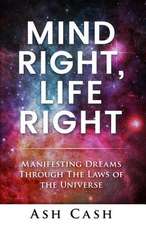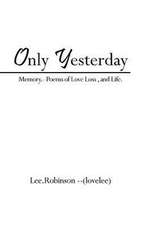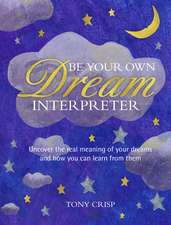Dream Dictionary
Autor Tony Crispen Limba Engleză Paperback – 31 dec 2001
NEWLY REVISED AND UPDATED FOR THE NEW MILLENNIUM!
Jam-packed with all-new material, including astonishing new scientific discoveries, Internet dreamsites, new categories, and new links, the bestselling Dream Dictionary is bigger and better than ever before.
Let dream therapist Tony Crisp be your guide on one of the most enlightening journeys you will ever take: into the world of your unconscious mind. From Abandoned to Zoo, based on material from thousands of dreams gathered during three decades of research, this essential reference is alphabetically organized, providing instant access to a wealth of fascinating information about:
• RECURRING DREAMS and their significance
• NIGHTMARES–what they reveal and how to banish them
• RELATIONSHIPS–what your dreams are telling you
• WORK–are you following the right career path? Your dreams will tell.
• FAMILY–how to resolve old hurts and gain new perspectives
• PROBLEM SOLVING in your dreams–how to carry the solutions into real life
• GAINING INSIGHT into your own behavior and that of others
• MAXIMIZING HEALTH–recognize healing foods, danger signs, and more
See what is happening in your body, in your mind, and in your most guarded self and intuitions....Discover what your style of dreaming (color, smell, setting, and other key elements) says about you. It’s all here, and more, in the ultimate guide to your world of dreams!
Preț: 57.71 lei
Nou
Puncte Express: 87
Preț estimativ în valută:
11.04€ • 11.53$ • 9.14£
11.04€ • 11.53$ • 9.14£
Carte disponibilă
Livrare economică 14-28 martie
Preluare comenzi: 021 569.72.76
Specificații
ISBN-13: 9780440237075
ISBN-10: 0440237076
Pagini: 464
Dimensiuni: 106 x 174 x 31 mm
Greutate: 0.23 kg
Ediția:Anniv Rev & Upd.
Editura: dell
ISBN-10: 0440237076
Pagini: 464
Dimensiuni: 106 x 174 x 31 mm
Greutate: 0.23 kg
Ediția:Anniv Rev & Upd.
Editura: dell
Notă biografică
Tony Crisp has had a long working relationship with dreams. In 1972 he wrote one of the earliest self-help books on dreams. In those years he also started one of the first human growth centers in the U.K., teaching people how to use dreams and the dream process for healing and personal growth. Since then three more of his books on dreams have been published, along with others on working with the dream process while awake, using spontaneous movement.
A previous version of Dream Dictionary has been translated into seven languages worldwide. Tony Crisp's insight into the dream process was so valued that he was London Broadcasting Company's dream therapist for seven years.
A previous version of Dream Dictionary has been translated into seven languages worldwide. Tony Crisp's insight into the dream process was so valued that he was London Broadcasting Company's dream therapist for seven years.
Extras
A
abandoned Feeling unwanted, particularly by parents. May have become habitual. It can lead to feelings of being unloved in the midst of what is really a happy and caring relationship; sometimes self-pity; can represent big changes in your life, such as leaving home, or traveling and living in another country, so feeling abandoned by one's friends and support. Such dreams may occur if you had to spend time in hospital as a child, or one of your parents died. If by a friend or relative: anxiety about losing friendship, or of illness creating a loss. Being abandoned in the sense of allowing sexual and emotional liberty: finding a new freedom; dropping usual social codes and unashamedly expressing yourself; it can be an example of one of the functions of dreams, to release held-back sexuality and emotion. See alone; hero/ine.
abbey See abbey under house, buildings.
abdomen See abdomen under body.
abduction Happening to someone else: the desire to influence or have power over someone. Happening to yourself: feeling influenced by someone or something else, against your inclinations or desires. This can occur when events in life, such as leaving school or home, push you into changes you do not embrace with pleasure. Or you may feel people you are involved with are forming a clique and pressuring you. Sometimes the pressure arises from within, from a part of you that is trying to emerge.
aboriginal The unsophisticated; inner contact with the natural life-processes within; feeling unified with nature. This often brings an intuitive wisdom. See Africa, African; black person; natives.
abortion Suggests an idea, a direction, or an area of one's feelings such as surround a love affair that has died or been lost; an attempted relationship, direction, or project is not supported by your confidence or desire. If dream connects with actual abortion: the emotions surrounding an actual experience of abortion; sense of guilt; the fears of damage to future possibility of childbearing; the feelings about loss of the baby. All these need to be healed in some measure. See baby.
Example: "I dreamt that my mum had a miscarriage. When I woke up I knew she had split with her current boyfriend. She rang up and I said, 'Mum, don't tell me, I know why you've rung, you've broken with your boyfriend.' She was amazed and asked how I knew." (Jane)
above See positions.
abroad Your feelings about that country, or the culturally held view of it; being in a new or changed life situation. If abroad or going abroad: making a change, doing something new; wanting to escape your present environment; getting away from it all. If someone or something arrives from abroad: a change; something new arising in your life. If you have lived in that country: overall experience of that place. Were you happy there, lonely, what characteristics of the people did you take in? Someone of the opposite sex from abroad: hopes for a new relationship; a relationship that has new features; difficulties with intimacy in present relationship. See travel.
absorb Dreams often represent learning as an organic process. Ideas are taken in, digested, then form part of an organic whole in an integrated system. Seeing something absorbed in a dream may represent absorbing ideas, or even poisonous feelings, depending upon what the dream images are.
abyss If feared: fear of losing control; fear of failure; lack of confidence; loss of identity; feelings about death; the unconscious. Having these fears in no way suggests the external or internal world warrants anxiety. But lack of confidence will obviously hamper performance in dealing with the difficulties represented by the abyss. Without fear: being able to take risks, not being afraid of illness and death in a paralyzing way. The void depicts the aspect of human consciousness existing beyond the opposites, such as good and bad, right and wrong. Access to this gives tremendous liberation to the dreamer, freeing them from restricting rigid concepts or habits of thinking, responding, and relating. See fall, falling; pit; void.
accelerator See accelerator under car.
accident Anxiety; self-punishment or introverted aggression. Occasionally a warning to watch one's step as attitudes may be predisposing one toward dangerous situations. Many people have strong feelings of anxiety about any dream that shows them having an accident or being injured. Research does not support the idea that such dreams predict impending disaster. Some people do have occasional warning dreams. See ESP in dreams. Accident at sea: feelings of threat about relationship; a sense there is a problem building up. Accident in car: tension about your efforts to "get somewhere" or achieve your goals. Take care in driving for a few days. See car. Accident in the home: tension may be building up in your home life; occasionally means you have unconsciously noticed something might cause an accident in the home. Therefore check whatever it is that produced the accident--i.e., is stair carpet loose if you dream of falling down stairs? An accident to someone else: could be hidden aggression. Plane crash: worries about a project such as business collapsing or not coping financially. Idioms: accidentally on purpose; chapter of accidents. See airplane.
acid Something burning away at your feelings or confidence, perhaps guilt or anxiety; your vitriolic attack on someone else; fear of getting "burnt" or hurt. Throwing acid on someone: purposely hurting someone; putting them to the test by being hurtful. Idioms: acid tongue; come the old acid (try to deceive); the acid test.
acting, actor/actress See famous people; actor/actress, acting under roles.
active imagination Carl Jung several times described a technique for using imagination that allowed the spontaneous expression of the unconscious. Jung described active imagination as a putting aside of conscious criticism while we allow our irrational to play or fantasize. In relationship to a dream, this technique can be extraordinarily helpful and revealing. A way to learn the technique is to take a dream in which a fairly defined person appears. It can be a child or adult. Then sit in a quiet situation alone or with a sympathetic listener and purposefully create an internal feeling or attitude that is noncritical and meditative. It may help to imagine that you have dropped any critical feelings and are listening with open heart to a friend. The aim is to allow the friend to express without your intervention or direction. This attitude is applied to yourself.
Having developed the right attitude, then hold the dream in mind, imagine yourself back in the feelings and environment of the dream and simply watch to see what develops in your imagination. By doing this you are listening to the unconscious and observing how it intervenes and communicates with consciousness by introducing changes, imagery, and feelings into your contemplation of the dream. See carrying the dream forward, under peer dream work.
active/passive You are in a passive role when you are an inactive observer in your dream, are all the time on the receiving end of dream action, or make no effort to move from discomfort. If this occurs frequently in your dreams, you are probably passive in your waking life. This habitual passivity can gradually be changed by such techniques as active imagination and imagining the dream forward. See processing your dreams.
ad See advertisement.
address Yourself; the way you live; your present style of life or status. Another person's address: contact with that person. Past address: the person you were, the traits you developed, what you faced in life at that time. To forget or lose your address: to lose sight of your goals or standards in life, or who you are. This suggests a loss of connection with, or a breakdown of the feelings and motivations that usually give you purpose and drive. Thus you would experience a sort of confusion about "where you live," i.e., your place in life and connection with others.
Adler, Alfred (1870-1937) Born in Vienna, Austria. Studied medicine, and later became a disciple of Freud. Diverged from Freud over Freud's idea that the sexual impulse was all important in human behavior. Adler saw people as goal oriented, with an urge toward personal growth and wholeness. He stated that in dreams we can clearly see our aggressive impulses and desire for fulfillment. Dreams can also help the dreamer define two often conflicting aspects of their experience--their image or sense of themselves, and their sense of what is socially acceptable. Because we strive from our earliest years to have some control over ourselves and our surroundings, we may develop a style of life around a sense of inferiority or lack of power. So a person who feels vulnerable may become aggressive to compensate. Adler therefore felt that in dreams we not only see what we think of ourselves, and what our environmental situation is, but also find a definition of our techniques for satisfying our drive to deal with and succeed in the world.
adolescent May refer to yourself and what you faced at that age; issues to do with sexual and social maturing; feelings about the opposite sex; undeveloped parts of self; potential for growth and creativity. See boy; girl; individuation; man; woman.
adventure If difficult: Facing things about yourself that are painful or you wish to avoid; anxiety, or difficulties with change. On an interesting/pleasant adventure: undertaking something new and/or difficult; a new opportunity presenting itself; making a change; undertaking the journey to meeting oneself.
advertisement A desire to have others know something about yourself; a way of bringing something to your attention; recognition of a need or opportunity. Advertisement for a job: desire for change; hope of something new; desire to find more satisfaction; recognition of opportunity.
advice Being given advice: what you need to know but perhaps wouldn't take from someone else; intuition--occasionally of utmost importance, especially if the figure in the dream is one you feel natural respect or veneration for; feeling pressured by other people's opinions. Giving advice: conscience; sense of "ought" or "should"; what you desire to say but haven't; what you know to be useful unconsciously, but perhaps haven't accepted. See voice; talking.
affair May depict feelings about infidelity; betrayal; failure; longing for love; feeling alone in a relationship. In general, dreaming of a pleasant affair is a way of enjoying or exercising the wonderful feelings of falling in love and sharing emotional and sexual pleasure. Having an affair in a dream may help keep alive and active the ability to love and be loved if there is not sufficient stimulus in waking life.
afraid See anxiety dreams; emotions, mood.
Africa, African This may refer to feelings about colored people or racial prejudices; Africa was the birthplace for the human race, so may refer to personal origins; if one is aware of particular associations, such as having lived in Africa or studied it, then it would probably refer to those associations. In dreams, white people often use tribal Africans or Australian Aborigines to represent their own natural inner life, the feeling urges or intuitions that guide or beset them. See aboriginal; black person; natives.
afternoon See time of day.
age Youth: that period of your life and its major lessons; lack of maturity; freshness and energy. Middle age: maturity; experience; facing old age and the changes it brings. Old age: wisdom; experience; lacking of pliability and freshness; worn-out or out-of-date.
air Your ability to survive well or badly in an environment; the invisible but felt social atmosphere within which you unconsciously exist and strive; support or lack of it given by your confidence or social acclaim or condemnation; when we talk about "clearing the atmosphere" or there being "something in the air," this is precisely what dreams of air often refer to; can also refer to a fear of not surviving in connection with what one is facing at the time. In other words, a strong sense of being overwhelmed by anxiety or some invading influence. See breath; wind.
air conditioner Perhaps one's lungs; a way that you "cool down" or calm your feelings or "blood pressure," so a way of dealing with stress; relief. If felt as cold: Something causing emotional withdrawal or coldness.
airplane Represents quick or dramatic life changes; taking a risk; vulnerable ideals, hopes, and plans; anxiety or fear; power to change, to transform one's situation, or to change or influence others; the desire to change one's lifestyle; getting away from the present situation or style of life. To climb aboard a plane is to embark upon dramatic movement from one way of life, or one situation in life, to another. It is a leap into the unknown, into chance--so it is a powerful symbol of change. Perhaps that flight into chance, into life and its mysterious possibilities might be okay. Or it might fall from the sky. Meanwhile, on the plane you will not have your feet on the ground, you will not be secure. The plans, the love, the hopes and efforts might work out or crash and lead to tragedy with all its rippling effects moving into the web of relationships and events connected with the flight of the plane.
An attacking aircraft: feeling attacked either by doubts and self-criticism, or by others.
Being grounded: sense of not getting anywhere; frustration; plans and hopes that haven't connected with achievement. Difficulty landing: difficulty achieving goal or making it real in a down-to-earth way; anxiety about where life events are taking you; feeling out of control or not being in control; difficulties or fears about being in someone else's hands. Plane falling rapidly: "pit" feeling in stomach that one gets when feeling anxiety about the outcome of a situation; sense of failure or guilt; apprehension about the future of a project or direction. Plane journey: a move toward independence; leaving home or friends; success. The plane is also a means of leaving things behind, rising above, or finding a way of escaping difficulties or the past. It is a way we move beyond the limitations of any one locality, racial customs, family attitudes, or religious environments. It is the power of the mind to move among and learn from or experience these many states of being. Private plane: One's personal activities and plans not deeply connected with other people. The crashed or wrecked plane: worry about failing. Can be anxiety bringing down ambition or adventurousness; a loss of self-confidence or mental equilibrium; warning about a business project; broken dreams and hopes. Watching a plane land safely: The arrival back to oneself of the actions, words and energies sent out into the world. See airport.
airport Making new departures; changes, hoped for or real; desire or need for adventure. This could be mentally, emotionally, or sexually; achieving goals; being en route to something, or something new in life; a checking of one's own values, identity, a sort of self-assessment in regard to independence and moving to new opportunities. Self-doubts and uncertainties at this stage stop you from attempting the new; occasionally the departure point for "higher planes"; considering that a flight might take us to new places, opportunities, or relationships, the airport can represent a terminus or change in connection with any of these. See airplane; foreign countries.
abandoned Feeling unwanted, particularly by parents. May have become habitual. It can lead to feelings of being unloved in the midst of what is really a happy and caring relationship; sometimes self-pity; can represent big changes in your life, such as leaving home, or traveling and living in another country, so feeling abandoned by one's friends and support. Such dreams may occur if you had to spend time in hospital as a child, or one of your parents died. If by a friend or relative: anxiety about losing friendship, or of illness creating a loss. Being abandoned in the sense of allowing sexual and emotional liberty: finding a new freedom; dropping usual social codes and unashamedly expressing yourself; it can be an example of one of the functions of dreams, to release held-back sexuality and emotion. See alone; hero/ine.
abbey See abbey under house, buildings.
abdomen See abdomen under body.
abduction Happening to someone else: the desire to influence or have power over someone. Happening to yourself: feeling influenced by someone or something else, against your inclinations or desires. This can occur when events in life, such as leaving school or home, push you into changes you do not embrace with pleasure. Or you may feel people you are involved with are forming a clique and pressuring you. Sometimes the pressure arises from within, from a part of you that is trying to emerge.
aboriginal The unsophisticated; inner contact with the natural life-processes within; feeling unified with nature. This often brings an intuitive wisdom. See Africa, African; black person; natives.
abortion Suggests an idea, a direction, or an area of one's feelings such as surround a love affair that has died or been lost; an attempted relationship, direction, or project is not supported by your confidence or desire. If dream connects with actual abortion: the emotions surrounding an actual experience of abortion; sense of guilt; the fears of damage to future possibility of childbearing; the feelings about loss of the baby. All these need to be healed in some measure. See baby.
Example: "I dreamt that my mum had a miscarriage. When I woke up I knew she had split with her current boyfriend. She rang up and I said, 'Mum, don't tell me, I know why you've rung, you've broken with your boyfriend.' She was amazed and asked how I knew." (Jane)
above See positions.
abroad Your feelings about that country, or the culturally held view of it; being in a new or changed life situation. If abroad or going abroad: making a change, doing something new; wanting to escape your present environment; getting away from it all. If someone or something arrives from abroad: a change; something new arising in your life. If you have lived in that country: overall experience of that place. Were you happy there, lonely, what characteristics of the people did you take in? Someone of the opposite sex from abroad: hopes for a new relationship; a relationship that has new features; difficulties with intimacy in present relationship. See travel.
absorb Dreams often represent learning as an organic process. Ideas are taken in, digested, then form part of an organic whole in an integrated system. Seeing something absorbed in a dream may represent absorbing ideas, or even poisonous feelings, depending upon what the dream images are.
abyss If feared: fear of losing control; fear of failure; lack of confidence; loss of identity; feelings about death; the unconscious. Having these fears in no way suggests the external or internal world warrants anxiety. But lack of confidence will obviously hamper performance in dealing with the difficulties represented by the abyss. Without fear: being able to take risks, not being afraid of illness and death in a paralyzing way. The void depicts the aspect of human consciousness existing beyond the opposites, such as good and bad, right and wrong. Access to this gives tremendous liberation to the dreamer, freeing them from restricting rigid concepts or habits of thinking, responding, and relating. See fall, falling; pit; void.
accelerator See accelerator under car.
accident Anxiety; self-punishment or introverted aggression. Occasionally a warning to watch one's step as attitudes may be predisposing one toward dangerous situations. Many people have strong feelings of anxiety about any dream that shows them having an accident or being injured. Research does not support the idea that such dreams predict impending disaster. Some people do have occasional warning dreams. See ESP in dreams. Accident at sea: feelings of threat about relationship; a sense there is a problem building up. Accident in car: tension about your efforts to "get somewhere" or achieve your goals. Take care in driving for a few days. See car. Accident in the home: tension may be building up in your home life; occasionally means you have unconsciously noticed something might cause an accident in the home. Therefore check whatever it is that produced the accident--i.e., is stair carpet loose if you dream of falling down stairs? An accident to someone else: could be hidden aggression. Plane crash: worries about a project such as business collapsing or not coping financially. Idioms: accidentally on purpose; chapter of accidents. See airplane.
acid Something burning away at your feelings or confidence, perhaps guilt or anxiety; your vitriolic attack on someone else; fear of getting "burnt" or hurt. Throwing acid on someone: purposely hurting someone; putting them to the test by being hurtful. Idioms: acid tongue; come the old acid (try to deceive); the acid test.
acting, actor/actress See famous people; actor/actress, acting under roles.
active imagination Carl Jung several times described a technique for using imagination that allowed the spontaneous expression of the unconscious. Jung described active imagination as a putting aside of conscious criticism while we allow our irrational to play or fantasize. In relationship to a dream, this technique can be extraordinarily helpful and revealing. A way to learn the technique is to take a dream in which a fairly defined person appears. It can be a child or adult. Then sit in a quiet situation alone or with a sympathetic listener and purposefully create an internal feeling or attitude that is noncritical and meditative. It may help to imagine that you have dropped any critical feelings and are listening with open heart to a friend. The aim is to allow the friend to express without your intervention or direction. This attitude is applied to yourself.
Having developed the right attitude, then hold the dream in mind, imagine yourself back in the feelings and environment of the dream and simply watch to see what develops in your imagination. By doing this you are listening to the unconscious and observing how it intervenes and communicates with consciousness by introducing changes, imagery, and feelings into your contemplation of the dream. See carrying the dream forward, under peer dream work.
active/passive You are in a passive role when you are an inactive observer in your dream, are all the time on the receiving end of dream action, or make no effort to move from discomfort. If this occurs frequently in your dreams, you are probably passive in your waking life. This habitual passivity can gradually be changed by such techniques as active imagination and imagining the dream forward. See processing your dreams.
ad See advertisement.
address Yourself; the way you live; your present style of life or status. Another person's address: contact with that person. Past address: the person you were, the traits you developed, what you faced in life at that time. To forget or lose your address: to lose sight of your goals or standards in life, or who you are. This suggests a loss of connection with, or a breakdown of the feelings and motivations that usually give you purpose and drive. Thus you would experience a sort of confusion about "where you live," i.e., your place in life and connection with others.
Adler, Alfred (1870-1937) Born in Vienna, Austria. Studied medicine, and later became a disciple of Freud. Diverged from Freud over Freud's idea that the sexual impulse was all important in human behavior. Adler saw people as goal oriented, with an urge toward personal growth and wholeness. He stated that in dreams we can clearly see our aggressive impulses and desire for fulfillment. Dreams can also help the dreamer define two often conflicting aspects of their experience--their image or sense of themselves, and their sense of what is socially acceptable. Because we strive from our earliest years to have some control over ourselves and our surroundings, we may develop a style of life around a sense of inferiority or lack of power. So a person who feels vulnerable may become aggressive to compensate. Adler therefore felt that in dreams we not only see what we think of ourselves, and what our environmental situation is, but also find a definition of our techniques for satisfying our drive to deal with and succeed in the world.
adolescent May refer to yourself and what you faced at that age; issues to do with sexual and social maturing; feelings about the opposite sex; undeveloped parts of self; potential for growth and creativity. See boy; girl; individuation; man; woman.
adventure If difficult: Facing things about yourself that are painful or you wish to avoid; anxiety, or difficulties with change. On an interesting/pleasant adventure: undertaking something new and/or difficult; a new opportunity presenting itself; making a change; undertaking the journey to meeting oneself.
advertisement A desire to have others know something about yourself; a way of bringing something to your attention; recognition of a need or opportunity. Advertisement for a job: desire for change; hope of something new; desire to find more satisfaction; recognition of opportunity.
advice Being given advice: what you need to know but perhaps wouldn't take from someone else; intuition--occasionally of utmost importance, especially if the figure in the dream is one you feel natural respect or veneration for; feeling pressured by other people's opinions. Giving advice: conscience; sense of "ought" or "should"; what you desire to say but haven't; what you know to be useful unconsciously, but perhaps haven't accepted. See voice; talking.
affair May depict feelings about infidelity; betrayal; failure; longing for love; feeling alone in a relationship. In general, dreaming of a pleasant affair is a way of enjoying or exercising the wonderful feelings of falling in love and sharing emotional and sexual pleasure. Having an affair in a dream may help keep alive and active the ability to love and be loved if there is not sufficient stimulus in waking life.
afraid See anxiety dreams; emotions, mood.
Africa, African This may refer to feelings about colored people or racial prejudices; Africa was the birthplace for the human race, so may refer to personal origins; if one is aware of particular associations, such as having lived in Africa or studied it, then it would probably refer to those associations. In dreams, white people often use tribal Africans or Australian Aborigines to represent their own natural inner life, the feeling urges or intuitions that guide or beset them. See aboriginal; black person; natives.
afternoon See time of day.
age Youth: that period of your life and its major lessons; lack of maturity; freshness and energy. Middle age: maturity; experience; facing old age and the changes it brings. Old age: wisdom; experience; lacking of pliability and freshness; worn-out or out-of-date.
air Your ability to survive well or badly in an environment; the invisible but felt social atmosphere within which you unconsciously exist and strive; support or lack of it given by your confidence or social acclaim or condemnation; when we talk about "clearing the atmosphere" or there being "something in the air," this is precisely what dreams of air often refer to; can also refer to a fear of not surviving in connection with what one is facing at the time. In other words, a strong sense of being overwhelmed by anxiety or some invading influence. See breath; wind.
air conditioner Perhaps one's lungs; a way that you "cool down" or calm your feelings or "blood pressure," so a way of dealing with stress; relief. If felt as cold: Something causing emotional withdrawal or coldness.
airplane Represents quick or dramatic life changes; taking a risk; vulnerable ideals, hopes, and plans; anxiety or fear; power to change, to transform one's situation, or to change or influence others; the desire to change one's lifestyle; getting away from the present situation or style of life. To climb aboard a plane is to embark upon dramatic movement from one way of life, or one situation in life, to another. It is a leap into the unknown, into chance--so it is a powerful symbol of change. Perhaps that flight into chance, into life and its mysterious possibilities might be okay. Or it might fall from the sky. Meanwhile, on the plane you will not have your feet on the ground, you will not be secure. The plans, the love, the hopes and efforts might work out or crash and lead to tragedy with all its rippling effects moving into the web of relationships and events connected with the flight of the plane.
An attacking aircraft: feeling attacked either by doubts and self-criticism, or by others.
Being grounded: sense of not getting anywhere; frustration; plans and hopes that haven't connected with achievement. Difficulty landing: difficulty achieving goal or making it real in a down-to-earth way; anxiety about where life events are taking you; feeling out of control or not being in control; difficulties or fears about being in someone else's hands. Plane falling rapidly: "pit" feeling in stomach that one gets when feeling anxiety about the outcome of a situation; sense of failure or guilt; apprehension about the future of a project or direction. Plane journey: a move toward independence; leaving home or friends; success. The plane is also a means of leaving things behind, rising above, or finding a way of escaping difficulties or the past. It is a way we move beyond the limitations of any one locality, racial customs, family attitudes, or religious environments. It is the power of the mind to move among and learn from or experience these many states of being. Private plane: One's personal activities and plans not deeply connected with other people. The crashed or wrecked plane: worry about failing. Can be anxiety bringing down ambition or adventurousness; a loss of self-confidence or mental equilibrium; warning about a business project; broken dreams and hopes. Watching a plane land safely: The arrival back to oneself of the actions, words and energies sent out into the world. See airport.
airport Making new departures; changes, hoped for or real; desire or need for adventure. This could be mentally, emotionally, or sexually; achieving goals; being en route to something, or something new in life; a checking of one's own values, identity, a sort of self-assessment in regard to independence and moving to new opportunities. Self-doubts and uncertainties at this stage stop you from attempting the new; occasionally the departure point for "higher planes"; considering that a flight might take us to new places, opportunities, or relationships, the airport can represent a terminus or change in connection with any of these. See airplane; foreign countries.
Descriere
This revised and updated edition of the popular guide is jam-packed with all-new material that includes astonishing scientific discoveries, new categories, and new links to dream analysis and interpretation. Crisp, a dream therapist, guides readers into the world of the unconscious mind in this alphabetically organized reference book.





















